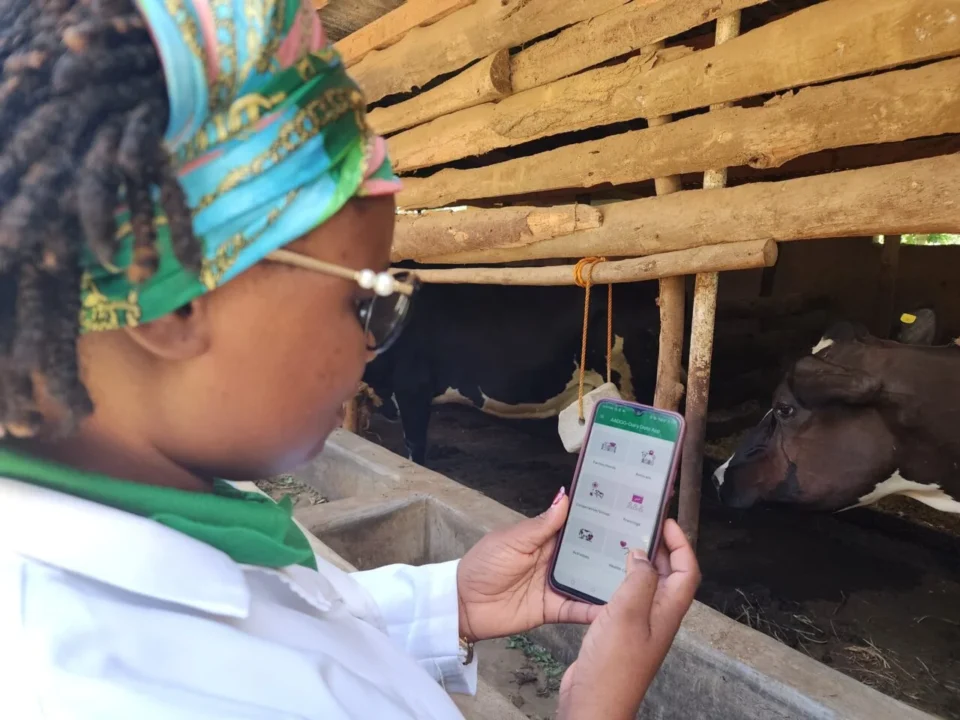The International Livestock Research Institute (ILRI) and the Centre for Tropical Livestock Genetics and Health (CTLGH) have launched an advanced livestock monitoring app as part of the African Asian Dairy Genetics Gains Project (AADGG). This new tool is designed to improve livestock productivity and support smallholder farmers by offering real-time capabilities in health monitoring, feed management, and artificial insemination data collection—features that were previously unavailable with the widely-used Open Data Kit (ODK) system.
The app allows users to search for and view historical data on individual cows, overcoming the limitations of the ODK system, which required a tablet or laptop and was difficult to access or retrieve data from. Developed specifically for smallholder dairy farmers across sub-Saharan Africa and Asia, the AADGG-Dairy Data App is designed to simplify farm registrations and record-keeping. It enables farmers, researchers, and AADGG collaborators to track household information, health, breeding, and productivity data on cattle.
The AADGG-Dairy Data App, available on Android smartphones, was rolled out in Ethiopia, Kenya, Tanzania, Uganda, and Nepal in late 2023. The app is a significant step forward in strengthening the selection of high-yielding, adaptable dairy genetics for smallholder farmers.
Raphael Mrode, ILRI Principal Scientist and CTLGH researcher, described the app as a “game-changer” for data collection, enhancing long-term sustainability and improving data capture accuracy.
Key Features and Benefits:
– Real-Time Data Collection: Instant recording of livestock health, breeding, and productivity data, with immediate feedback.
– Advanced Modules: Six modules track pedigree, milk output, farm size, animal traits, and more, providing comprehensive insights.
– Historical Data Access: Unlike the ODK system, the app allows farmers to access past records, improving decision-making.
– User-Friendly Design: Accessible via Android smartphones, with future plans for local language translations to enhance accessibility.
Bridging Digital Gaps with Technology
As smartphone usage increases across Africa, the app aims to address the digital divide in agriculture. In Kenya alone, there are over 34.5 million smartphone users, providing a strong foundation for the app’s adoption.
“The app’s interface and real-time feedback solve key challenges farmers face, enabling better livestock management for improved productivity,” said Jennifer Volk, Senior Information and Data Systems Lead at CTLGH.
Developed in collaboration with Unmiti, a Hyderabad-based software company specializing in agricultural digital tools, the app offers valuable insights into herd health, breeding trends, and farm economics, paving the way for more sustainable farming practices.
Initially, the app was tested by performance recording agents who collect farming data in rural areas. While it is not yet directly available to farmers, plans to translate the app into local languages will increase accessibility. The app includes modules for collecting breeding, insemination, herd health, and other productivity data, making it a versatile tool for comprehensive livestock management.
“Once the data begins flowing and its accuracy is verified, we can roll out the app to farmers,” Mrode added. “The cost of collecting data will also decrease since agents won’t need to visit individual farmers in the villages. Instead, farmers will record their own information.”
ILRI and CTLGH’s development of this app underscores their commitment to empowering smallholder farmers through innovative technology. The organizations invite stakeholders, policymakers, and development partners to join efforts in scaling the app’s impact and transforming global farming practices.



